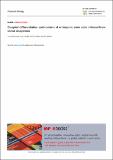Coupled differentiation and division of embryonic stem cells inferred from clonal snapshots
Abstract
The deluge of single-cell data obtained by sequencing, imaging and epigenetic markers has led to an increasingly detailed description of cell state. However, it remains challenging to identify how cells transition between different states, in part because data are typically limited to snapshots in time. A prerequisite for inferring cell state transitions from such snapshots is to distinguish whether transitions are coupled to cell divisions. To address this, we present two minimal branching process models of cell division and differentiation in a well-mixed population. These models describe dynamics where differentiation and division are coupled or uncoupled. For each model, we derive analytic expressions for each subpopulation's mean and variance and for the likelihood, allowing exact Bayesian parameter inference and model selection in the idealised case of fully observed trajectories of differentiation and division events. In the case of snapshots, we present a sample path algorithm and use this to predict optimal temporal spacing of measurements for experimental design. We then apply this methodology to an in vitro dataset assaying the clonal growth of epiblast stem cells in culture conditions promoting self-renewal or differentiation. Here, the larger number of cell states necessitates approximate Bayesian computation. For both culture conditions, our inference supports the model where cell state transitions are coupled to division. For culture conditions promoting differentiation, our analysis indicates a possible shift in dynamics, with these processes becoming more coupled over time.
Citation
Ruske , L J , Kursawe , J , Tsakiridis , A , Wilson , V , Fletcher , A , Blythe , R A & Schumacher , L J 2020 , ' Coupled differentiation and division of embryonic stem cells inferred from clonal snapshots ' , Physical Biology , vol. 17 , no. 6 , 065009 . https://doi.org/10.1088/1478-3975/aba041
Publication
Physical Biology
Status
Peer reviewed
ISSN
1478-3967Type
Journal article
Description
AGF was supported by a Vice-Chancellor's Fellowship from the University of Sheffield, LJS was supported by a Chancellor's Fellowship from the University of Edinburgh.Collections
Items in the St Andrews Research Repository are protected by copyright, with all rights reserved, unless otherwise indicated.

